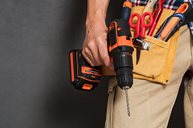Income Tax Guide for Airtaskers
So, you're earning some extra income from Airtasker. Congratulations! Spend it wisely – and don't forget the taxman. The key to staying out of trouble with the ATO is to keep records. Even if you've played everything by the book, if you don't have documentation to support your position if the ATO asks you questions, you could find yourself stuck with an additional tax bill, plus penalties and interest.
Here at H&R Block we help lots of customers who work in the sharing economy. It's essential to get your taxes right and we can help.
DO I NEED TO PAY TAX ON MY AIRTASKER INCOME?
Yes, you do. Each year, you probably earn money from a number of sources, of which Airtasker might be one. Others might include income from employment, income from other businesses you run and investment income from things like bank interest, share dividends or rental income from property. All of this income is taxable. You need to keep a record of all the tasks you do using Airtasker and the amounts you earn from each of those tasks. That income needs to be disclosed as business income on your tax return and you need to record the gross amount that customers pay you, not the net amount you receive after Airtasker has taken out its fees/charges.
CAN I CLAIM ANY DEDUCTIONS AGAINST MY AIRTASKER INCOME?
Yes you can. Any expenses incurred in generating your Airtasker income are deductible.
Deductions that can be claimed for the business include a proportion of the following:
-
Commissions or fees paid to Airtasker
-
Costs of traveling to and from an Airtasker job and between jobs including
- Parking
- Fuel
- Public Transport
- Flights and accommodation if the job is interstate -
Safety equipment (such as hi-vis vests)
-
Work-related clothing such as overalls and workboots
-
Sunglasses if you work outside
-
Insurance
-
Tax agent/accountants fee
-
Bank fees (if you maintain a separate account for your business)
-
Costs of running a home office if your business is operated from home
Deductions that cannot be claimed:
-
Fines (parking, speeding, etc)
-
Clothing other than safety clothing
-
Meals or drinks, etc purchased whilst on the job
CAPITAL ASSETS REQUIRED FOR YOUR BUSINESS
You can claim deduction for the decline in value of capital assets that you acquire for use in your business. If the assets are used for private purposes as well as for the business, a deduction can only be claimed for the proportion that relates to the business.
For the 2024, 2025 and (subject to the passage of the legislation) the 2026 years, businesses with a turnover of less than $10 m will be able to claim a deduction for the business use percentage assets that cost less than $20,000 in full under the Instant Asset Write-Off provisions. This is great for purchasing items like computers, phones, tablets, tools and even motor vehicles.
CAN I CLAIM CAR EXPENSES?
Yes, but only if you use your car as part of your Airtasker business. There are two ways to claim a deduction for business use of your car:
- Cents per kilometre: Claim 88c per kilometre (for the 2025 year). This method is only available for distances up to 5,000km. If you travel more than 5,000 kms for your business in your car, you will only be able to claim for 5,000 using this method. This method incorporates all car expenses including petrol, servicing, depreciation, etc. You can make no further claim.
- Logbook: Your claim is based on the business use percentage of each car expense, which is determined by a logbook that must have been kept for a minimum 12 week period. This logbook must be updated every five years. You can claim all expenses that relate to the operation of the car, at your percentage of business use, as established from your logbook. In order to claim a deduction, you must be able to prove that you spent the money and that the purchase relates to your business, so remember to keep invoices, receipts, bank statements and logbooks.
DO I NEED AN ABN?
If you are an Airtasker worker, you are in business as a self-employed person. You aren't employed by Airtasker. That means you must have an ABN.
If your business turnover is expected to be more than $75,000 you will also be required to register for GST, and include GST in the amount you charge. H&R Block can help set up you ABN and all necessary tax registrations.
SO I HAVE INCOME & DEDUCTIONS. WHAT NEXT?
If your income exceeds your expenses, the surplus is added to your other taxable income and you pay tax on it. If your expenses exceed your income, the loss may be available to offset against your other taxable income (subject to some complex anti-avoidance rules covering non-commercial losses). If you have no other taxable income or the non-commercial loss rules apply, the loss is carried forward.
HOW DO I REPORT ALL THIS?
In your income tax return. This needs to be submitted by 31 October if you do your tax return yourself. If you use a tax agent like H&R Block, you have an extended period to lodge, which could run as late as 15 May the following year.
If you are registered for GST, will also be required to lodge Business Activity Statements (BAS), generally quarterly, to report the GST collected from your clients, and claim credits for the GST you paid on your business related expenses.
WHAT DOCUMENTS DO I NEED?
- Income and sales records - details of all the jobs you have done through Airtasker breaking down gross income less Airtasker fee
- Expense or purchase records - It's important to keep records of all your business expenses such as materials, motor vehicle costs (fuel, servicing and repairs), work specific clothing, etc including cash purchases. Records could include receipts, invoices, credit card vouchers and diaries to record small cash expenses. If you purchased something which is partly used for private use and partly for business use, you'll need to keep a record showing how you worked out any private use for that item. For example, if you purchase a mobile phone which costs $500 (exclusive of GST, if applicable) and is used 90% in the business and 10% privately, you can only claim a tax deduction on $450 (being 90% of the costs).
- Year-end records - These include lists of people that you owe money to (creditors) and lists of people who owe you money (debtors). You'll also need worksheets to calculate the decreasing value of your assets (of which your car might be the main one). These are called 'depreciating assets'. This calculation can be complex and you might be best to get your accountant to prepare this for you.
- Bank records - Documents you receive from the bank such as bank and credit card statements and loan documents.
- Goods and services tax (GST) records (if applicable) - The main GST records you need to keep are tax invoices from your suppliers. You need a tax invoice to claim GST credits. Allow time each week to keep your records up-to-date. This helps when it's time to do your tax as all the information is already there and you're not overwhelmed with paperwork. This frees up time to focus on making money, instead of doing paperwork.
WHAT IF I GET IT WRONG?
The ATO has been keeping a close eye on people earning income from shared economy services like Airtasker. It's essential that you fully and accurately disclose all your Airtasker income (and expenses). If you don't, you could find yourself being audited by the ATO, and they will charge interest and penalties on any unpaid or underpaid tax.
BOOK AN APPOINTMENT WITH H&R BLOCK TODAY
Find your nearest H&R Block office and book an appointment.
Updated June 2025




.png?width=55&height=48&ext=.png)
-1.svg)

